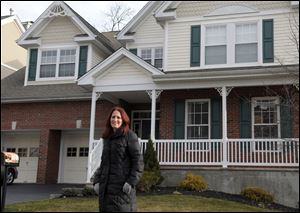
Housing crisis has complicated divorces in must-sell situations
2/26/2012
Jaimie Bolnick and her ex-husband, Michael Bolnick, lived together as they tried to sell their Oakland, N.J., house. Agents say divorcing spouses are better off if they can keep their emotions under control.
HACKENSACK, N.J. -- Months after they agreed to split up, Jaimie and Michael Bolnick continued to live together as they tried to sell their house in Oakland, N.J.
"It was really hard," Ms. Bolnick recalled. "You're living in the house and trying to stay out of each other's way. Mealtimes were awkward -- are you sitting together as a family?"
The Bolnicks' house sale took a year, and is just one example of how a slow real estate market can complicate matters when a divorce forces a sale.
"Selling a home is an emotional experience for most homeowners," said Terri Golden, a Coldwell Banker agent in Fort Lee, N.J. "Selling as a result of divorce makes the experience even more emotionally difficult."
In many divorces, "listing the home becomes another huge symbol of their losses," said Deborah Innocenti, a Keller Williams agent in Ridgewood, N.J.
And worse yet, the drop in home values in the past several years means that many divorcing couples are "underwater" on their mortgages.
"The house used to be the major asset for people; it's not anymore," said Bruce Chase, a matrimonial lawyer in Hackensack. Divorcing couples used to divide the equity in the house, but many now owe more than the property is worth. Often, Mr. Chase said, that leads to a short sale, in which the lender forgives part of the mortgage and allows the homeowner to sell the house for less than is owed.
Sometimes, if they can afford it, "one of them stays in the house, hoping that the housing market will change, they'll eventually have some equity," said Mr. Chase, co-chairman of the family law committee of the Bergen County Bar Association.
A divorcing couple must decide whether to sell or whether one will buy out the other's share. If they decide to sell, they must agree on when to put the property on the market, how to price it, how to prepare it for showing and how to handle offers. Those can be thorny questions, even for happy couples, never mind those in the middle of divorce.
But divorcing spouses are better off if they can keep their emotions under control, agents say.
"If they're smart, they'll work hard to agree on as much as possible so as not to churn up unnecessary attorney fees," said Robert Lindsay of Coldwell Banker in Wayne, N.J.
"In good situations, they act intellectually and price the house for the market so that they can each get their portion and move on," said Alberta Ceres-Buda of ERA A.J. Cali Real Estate in Hawthorne, N.J. Often, however, "the partners can't agree on anything because their emotions are running strong."
"In a divorce, there's always one that wants out more than the other, and there's always one holding on [to the house] for dear life," said Ms. Bolnick, a Re/Max real estate agent in Franklin Lakes, N.J., who specializes in clients who are divorcing.
Spouses who aren't ready to let go of a home can do plenty to delay a sale, real estate agents say. They can insist on an unrealistic asking price -- a deal-killer in this buyers' market. They can then refuse to lower the price, even after months go by without an offer. To avoid this scenario, Mr. Chase said he recommends that the couple agree in advance to price cuts if the house isn't sold after a specified time.
Others sabotage a sale by refusing to keep the house clean; being "too busy" to arrange showings or even cooking smelly foods before prospective buyers tour the home.
Market conditions sometimes force couples to stay together in the house long after they're on the road to divorce, like the Bolnicks.
"You see a lot of couples staying in the house together until the bitter end," said Ms. Bolnick. "People in this economy can't afford to have two homes and a big mortgage."
"Couples sometimes postpone the sale of the house, thinking they cannot afford to sell now and live separately. So they may make a conscious decision to live in the same house until the economy picks up and raises the home's value," said Randy Douglass of ERA Douglass Realtors in Montvale, N.J.
Other couples reluctantly accept a lower price so they can move on.
Mark Rogers and Dary Strauss sold their Mahwah, N.J., town house at a loss, after it was on the market for close to a year. They had paid $660,000 for the home in 2005, in a hot market, and sold for about $500,000 last year.
"We got killed," Ms. Strauss said. "It wasn't a wonderful feeling, but we were happy we got what we got." They both believe that if they had waited longer, they might have gotten less. And they took some comfort in the large gains they'd made in two previous home sales. "I've been lucky before," said Mr. Rogers. "This time I took a loss."